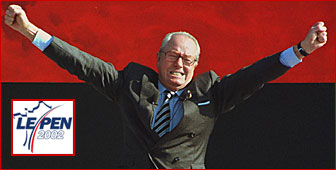Swiss right denies parallels with Le Pen

Jean-Marie Le Pen's showing in the French presidential election has stunned Europe, and fuelled fears of a continent-wide resurgence of the far right.
Le Pen grabbed over 17 per cent of the vote in Sunday’s first round, pitting him against the incumbent, Jacques Chirac, in the run-off and condemning Prime Minister Lionel Jospin to political oblivion.
Parallels were immediately drawn with the successes of right-wing parties in other countries, including Switzerland, where the Swiss People’s Party vastly increased its share of the vote in the last elections.
But is it reasonable and appropriate to compare the People’s Party and its figurehead Christoph Blocher with the likes of Le Pen and Austria’s Jörg Haider?
Blocher is “not Le Pen”
All three may be riding a wave of popular disenchantment with Europe and immigration policy, but many observers say Blocher, for all his inflammatory rhetoric, is “not a Le Pen”.
Even Social Democrats – the most left leaning of Switzerland’s main parties – shy away from such comparisons.
Nonetheless, analysts believe the rise of the right is largely due to the failure of mainstream parties to take voters’ concerns seriously.
“In Switzerland, as in other countries, the mainstream parties have not been responding to the people’s demands, and that is where Blocher is having some success,” says political scientist, Julian Hottinger.
Officially the federal authorities are saying nothing about Le Pen’s success. A source at the Foreign Ministry said the government never commented on elections in other democratic countries, “even if Le Pen does well”.
“A horror for France”
But the Swiss economics minister, Pascal Couchepin, speaking in Washington, said the result was “incredible and unimaginable” and represented a “horror for the French people”.
There was also consternation among French citizens resident in Switzerland. One, Pierre Oliviero, a Geneva shopkeeper, was not alone in describing the result as a “political earthquake”. “This has serious implications for French democracy. We are in danger of being compared to Austria,” he warned.
Unlike the rest of their compatriots, the French living in Switzerland gave Chirac three times as many votes as Le Pen, who got just eight per cent. Prime Minister Lionel Jospin came in second.
Le Pen’s success owes much to the peculiarities of the French electoral system, where voters traditionally voice their discontent in the first round before falling into line behind mainstream candidates in the second. It was this that fatally split the left-wing vote and allowed Le Pen into the run-off.
Resurgent nationalism
But the success of Le Pen’s National Front is typical of a resurgent brand of populist nationalism across Europe that has taken advantage of growing disillusionment with centre-left governments and the European Union and a growing animosity towards immigrants.
In recent times far-right parties in Italy, Austria, Denmark, Portugal, Belgium and the Netherlands have seen success at the polls.
The Swiss, too, have experienced this phenomenon. At the last federal elections in 1999, the People’s Party made big gains, which it has repeated in regional elections since, especially in urban areas.
The People’s Party told swissinfo it would not be making any official comment on Le Pen’s electoral success, though its national president said there were no parallels between it and the National Front.
But privately many members will be heartened that their own concerns – immigration, law and order, Europe, traditional values – have found an echo in France.
Other Swiss parties voiced their concerns. The Social Democrats expressed their “surprise, disappointment and concern” at Le Pen’s performance, because it meant that “the far-right is back again”.
National unity
“Le Pen won’t win in the second round, but we can observe throughout Europe how the extreme populists are gaining votes,” says Kaspar Sutter, the party’s International Secretary. “If voters are putting national interests first, it’s not good for the future development of the European Union.”
“We on the left need be self-critical, and reflect on whether we are tackling these issues in the right way and addressing the fears of the population,” he told swissinfo.
The president of the Radical Party, Gerold Bührer, said Le Pen’s success was a “dangerous sign” which revealed the “serious frustration” of voters.
The Christian Democrat secretary general, Reto Nause, said Le Pen’s breakthrough represented a make-or-break test for stability in France: “If such extreme views made a breakthrough in Switzerland, it could entail unimagined problems. Here, a strengthening of the People’s Party would mean a weakening of national unity,” he added.
Julian Hottinger, though, believes that is unlikely, given Switzerland’s system of direct democracy.
“You must remember that, when it comes to key decisions, it’s the citizens who decide,” he says. “When it comes to precise issues, Blocher has a lot of difficulty in getting the backing he gets in elections.”
Charisma
Hottinger does, however, see one obvious similarity between Le Pen and Blocher – the strong showing of their parties is based only partly on their policies. Much of their support is down to their charismatic personalities.
“Without Le Pen, the National Front is nothing. Without Blocher, the People’s Party is nothing,” he says.
Commentators in France and the rest of Europe have described Sunday’s result as a political earthquake, a seismic shock. But the true test will have to wait for June’s legislative elections.
Will those socialists who chose not to cast their ballot, or who chose fringe candidates, return to the fold? Only then will it be clear whether the French political landscape has altered irrevocably.
by Roy Probert

In compliance with the JTI standards
More: SWI swissinfo.ch certified by the Journalism Trust Initiative
You can find an overview of ongoing debates with our journalists here . Please join us!
If you want to start a conversation about a topic raised in this article or want to report factual errors, email us at english@swissinfo.ch.